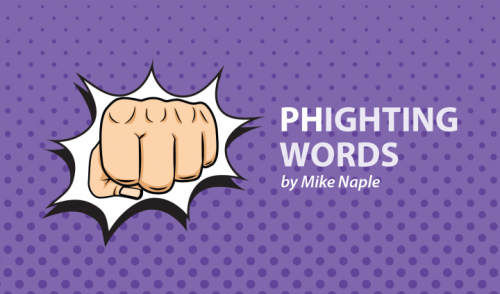Treatment Cost Worries Make It Harder to Focus on My Health
Written by |

PHighting Words Mike Naple
Living with a chronic illness or rare disease definitely comes with a price tag. There are added expenses related to medical equipment and devices, doctors’ appointments, tests and procedures, and of course, the cost of prescription drugs, which can really pile up month after month.
I remember feeling incredibly frustrated when I first picked up prescriptions to manage my pulmonary hypertension, less than an hour after being discharged from the hospital in 2016. Tadalafil — a medication to keep my pulmonary arterial pressures low — was among the prescriptions I needed. The pharmacist quoted me a price over $1,000 for one month’s supply of the drug, causing a slight panic to rise inside me. Here I was, fresh from the hospital, still mentally processing my PH diagnosis, and the fiscal realities of being sick and needing to use the healthcare system flew right at my head.
Seeing the frightened look on my face, the pharmacist offered to switch me from tadalafil to sildenafil to help lower the price of the medicine. My health insurance would also kick in and help carry some of the burden. I knew that if push came to shove, I had a family and support network I could lean on, so affording my medications wouldn’t be an impossible reality.
Unfortunately, my experience at the pharmacy is not often the norm for many other people in this country. Not everyone is able to walk away from the counter with their prescriptions, including many folks in the chronic illness, rare disease, and disability community.
More broadly, research from Gallup and West Health found that roughly 46 million Americans, or nearly one in five adults, chose not to seek treatment for a health issue in the previous year because they would not have been able to afford it. That same survey showed that 22% of respondents saw the high costs of prescription drugs as a financial barrier to care, and millions of Americans reported cutting back on essentials like food and utility bills to pay for needed medicines or healthcare services.
I take multiple medications throughout the day. Managing those medications — taking them on schedule and ordering refills — often feels like a full-time job, on top of worrying about the exorbitant costs. Whenever I talk to my pulmonary specialist about my progress and whether or not we need to switch up my medications regimen, I can’t help but think about how changes in type, dosage, and name brand versus generic prescription drugs will alter what I’m expected to pay out of pocket. Instead of paying attention to how the medicine will improve my quality of life with PH, I’m seeing dollar signs because I’m focused more on the cost of care than the care itself.
A few years ago, I found myself running low on sildenafil but my insurance carrier hadn’t yet authorized a prescription refill. The pharmacist asked me if I wanted to pay the out-of-pocket price of $1,600 for a 30-day supply. I wrote previously about this difficult choice, noting at the time how the out-of-pocket amount surpassed my monthly rent check and I wouldn’t be able to afford it. I decided to wait until my insurance would authorize the refill, choosing to risk the possibility of running out of this life-sustaining medication.
I am grateful that I can still work full time and access health coverage through my employer because it lowers the cost of my prescription drugs. That said, I know I won’t be able to work as much as I do now. There is a reality where my PH progresses and I need more effective medicines to manage the disease and maintain my quality of life. These drugs could cost more, especially if I’m unable to afford quality health coverage.
Like other rare diseases, medications to treat PH can be expensive and require patients to seek options for assistance. One’s ability to afford essential prescription drugs should not be akin to a superpower, winning the lottery, or finding Willy Wonka’s golden ticket.
The good news: This doesn’t have to be the norm. Things can change. I am encouraged by the renewed public conversation and opinion around federal lawmakers in Washington, D.C. prioritizing action on healthcare policies, including mechanisms to cap out-of-pocket expenses and make prescriptions more affordable for millions of patients.
Healthcare issues like outrageous drug costs remind me how important it is to advocate for my own health — in front of my doctor, my pharmacist, and my elected representatives. Members of the PH community interested in advocacy work should look at the resources available through the Pulmonary Hypertension Association. Policymakers need to hear from this community, and working together, telling our stories, we can advocate for real change.
Follow Mike Naple on Twitter: @mnaple.
***
Note: Pulmonary Hypertension News is strictly a news and information website about the disease. It does not provide medical advice, diagnosis, or treatment. This content is not intended to be a substitute for professional medical advice, diagnosis, or treatment. Always seek the advice of your physician or other qualified health provider with any questions you may have regarding a medical condition. Never disregard professional medical advice or delay in seeking it because of something you have read on this website. The opinions expressed in this column are not those of Pulmonary Hypertension News or its parent company, Bionews, and are intended to spark discussion about issues pertaining to pulmonary hypertension.




Leave a comment
Fill in the required fields to post. Your email address will not be published.